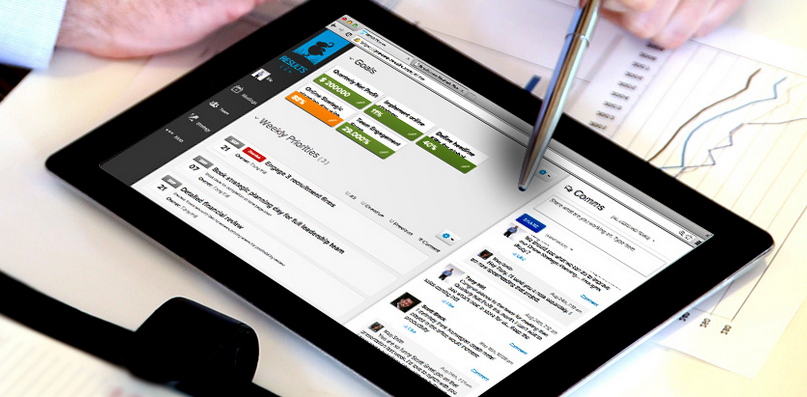
A tour of top US tech companies was the trigger that led Ben Ridler to see the light and ditch consulting in favour of building a real product.
“The Better by Design programme was the catalyst for me getting out of consulting and going and building standalone software,” he says.
“The whole premise of consulting is we impart knowledge from on high. The premise of design is we learn from our users.”
Ridler sold his stake in the consultancy now known as Results Group, and is now coming up on the first year in business and $1 million in revenue for the standalone Results.com. The business software, he says, is designed as a platform to manage a business and uniquely straddles a few categories. There are parallels with business intelligence software Domo or, in part, collaboration tool Asana, although the latter is project-based rather than bigger-picture.
One frustration Ridler observed as a consultant was well-intentioned leadership with big dreams that ultimately struggled to engage the rest of the company in that mission. As he describes it, it’s about showing why and how each individual’s contribution helps, connecting the frontline to higher up influencers.
“It’s about making that visible. Everyone can see what they do and how it connects to the plan. As a business owner it’s the thing I’ve always felt was needed.”
He says large corporates adapt big software programmes to run their companies, while SMEs often rely on Excel to do the same thing – or an accounting package that’s only ever seen by the CEO and/or CFO.

With nearly 5,000 paying clients, Ridler reckons about 40 percent of customers are in the US and a similar proportion in Australasia, with the remaining 20 percent hailing from other regions (the company has users in about 16 countries). The goal is 100,000, and a potential listing on the market this year. The company has already had investment from NZTE and private investors and is now looking to raise around $5 million in its second round.
The next stage also includes a focus on partnerships (current integrations include Xero and Salesforce) with companies with similar client bases. Ridley says the aim is to emulate the channel model Xero has built.
“Our product creates a lot of services work. Most companies haven’t got KPIs that are especially suitable for the digital age … they need someone to help drill into what they should be measuring.
“We can do a lot of that in an automated way but sometimes it’s easier to work with an accountant or business coach. Another thrust for us this year will be putting a lot of resource into building a channel of those consultants and accountants who we teach the systems and processes we use.”




